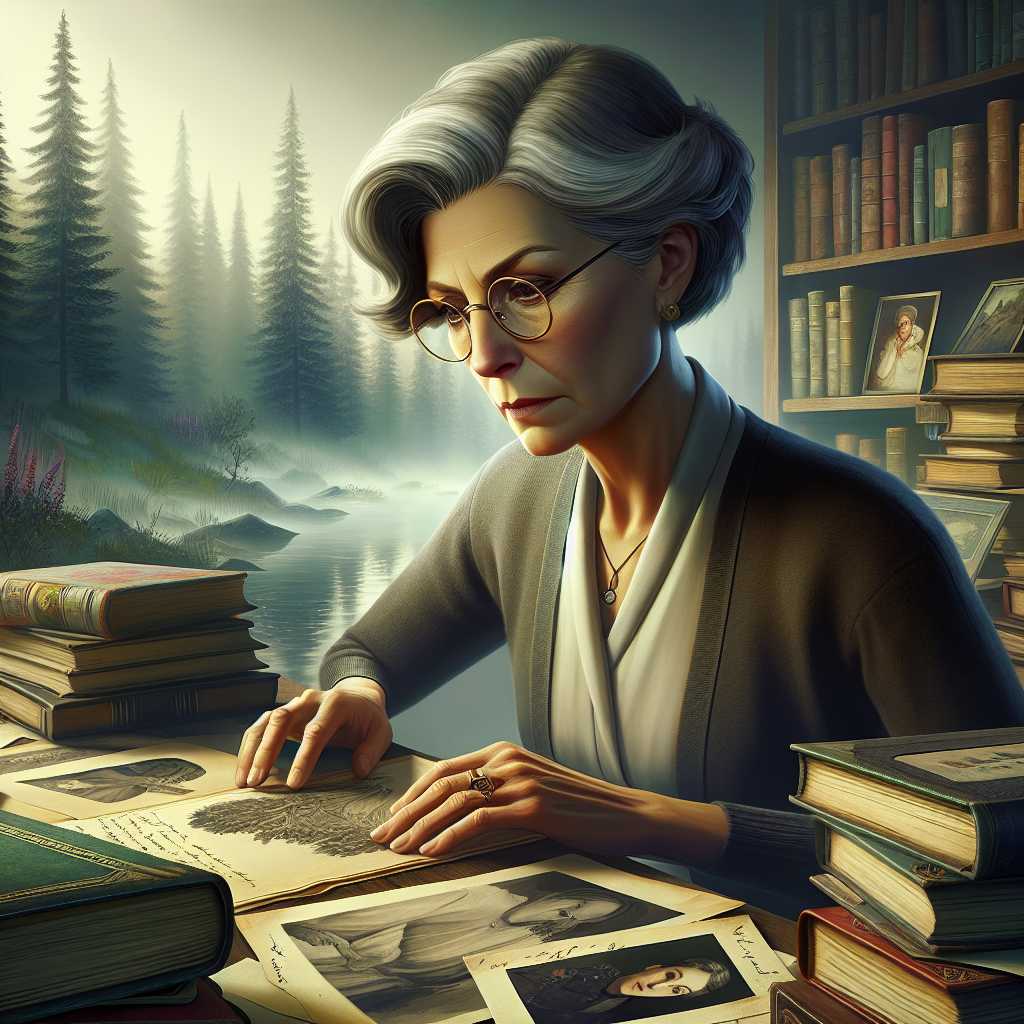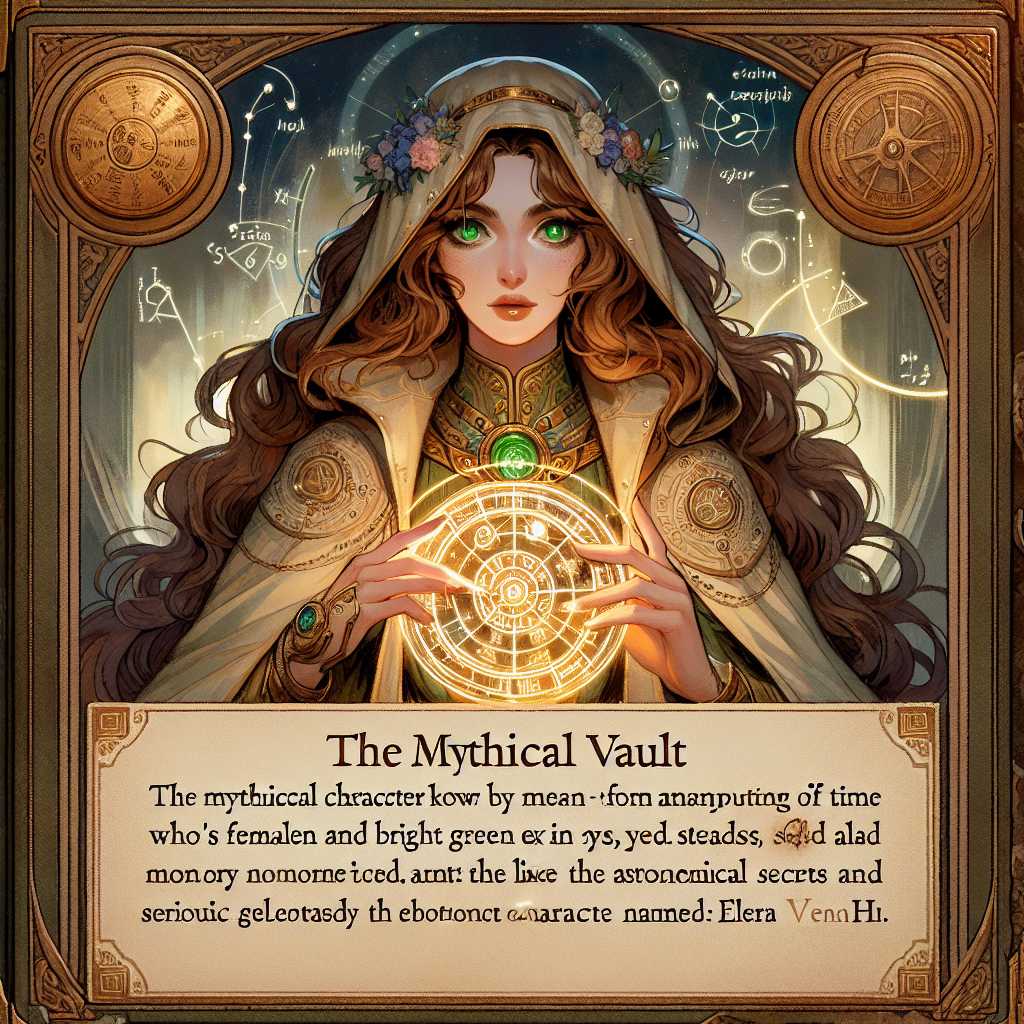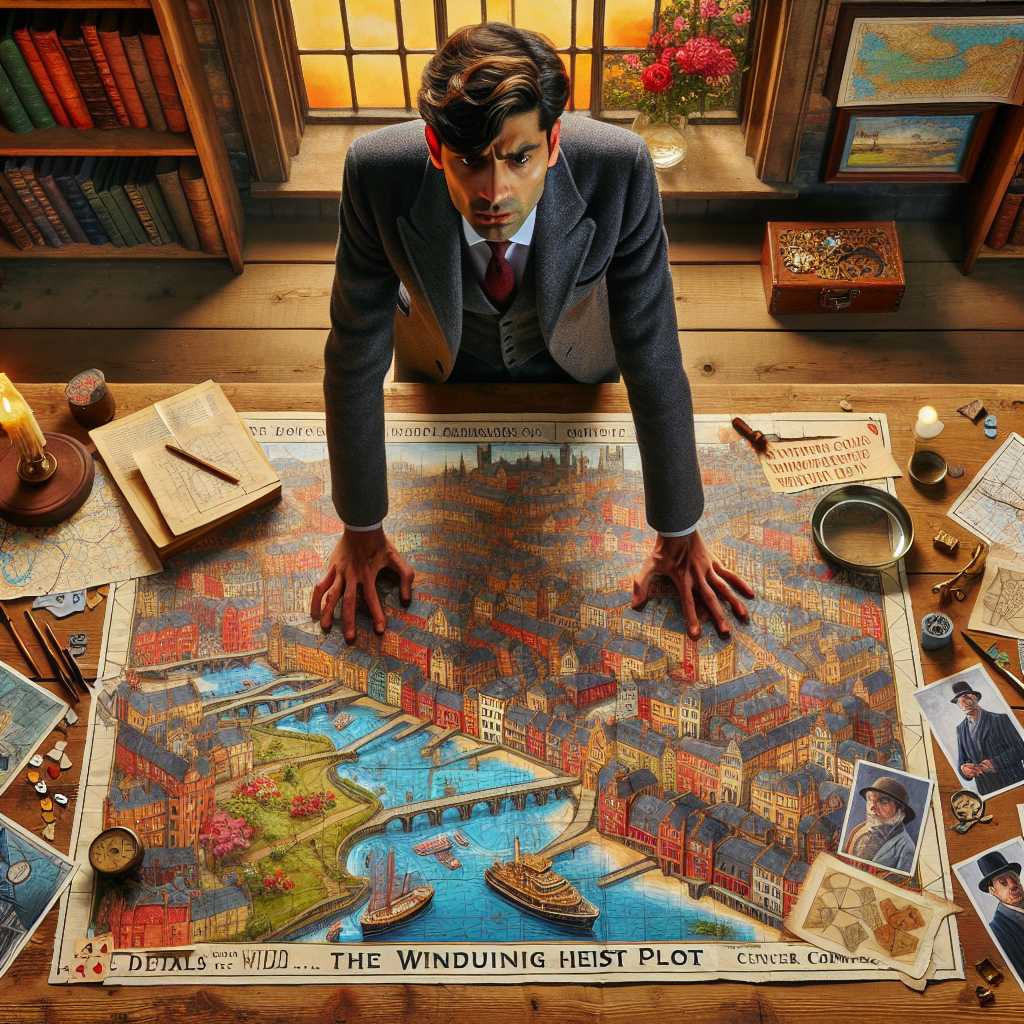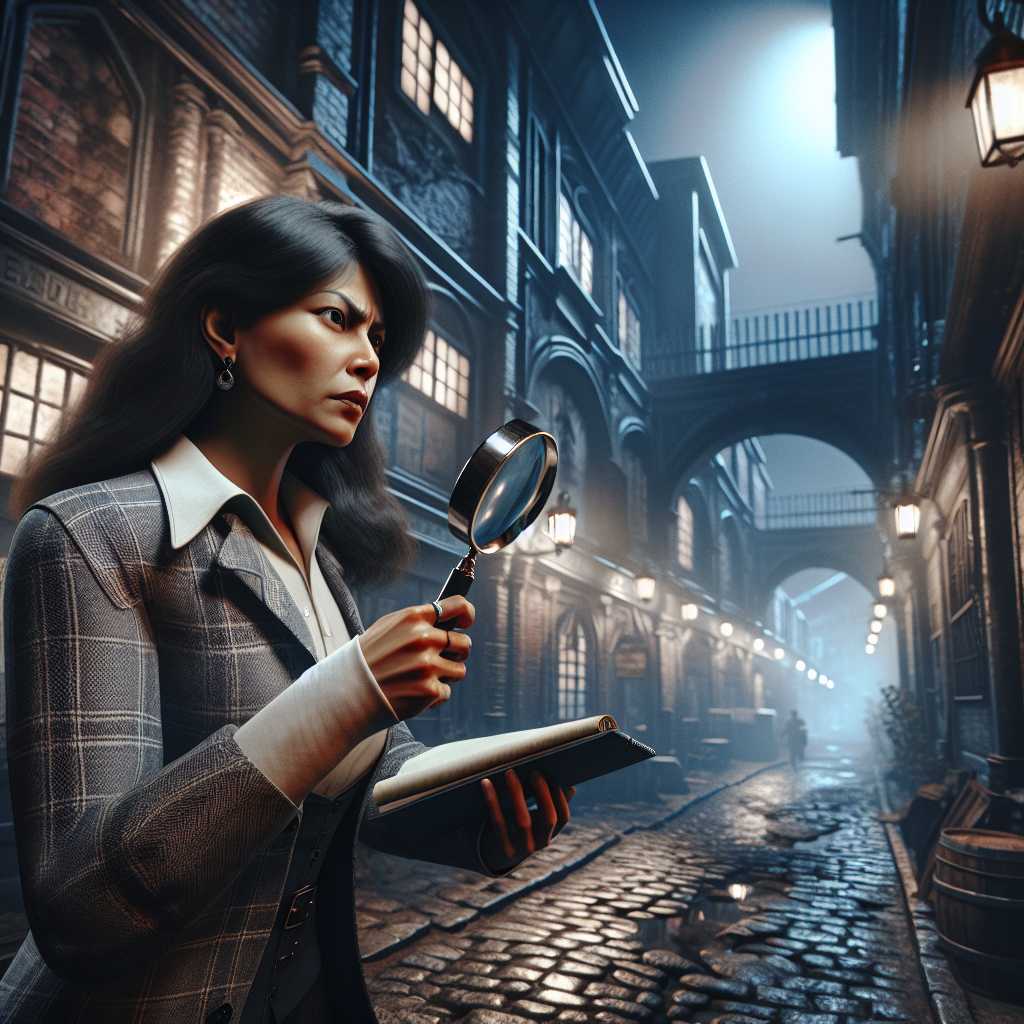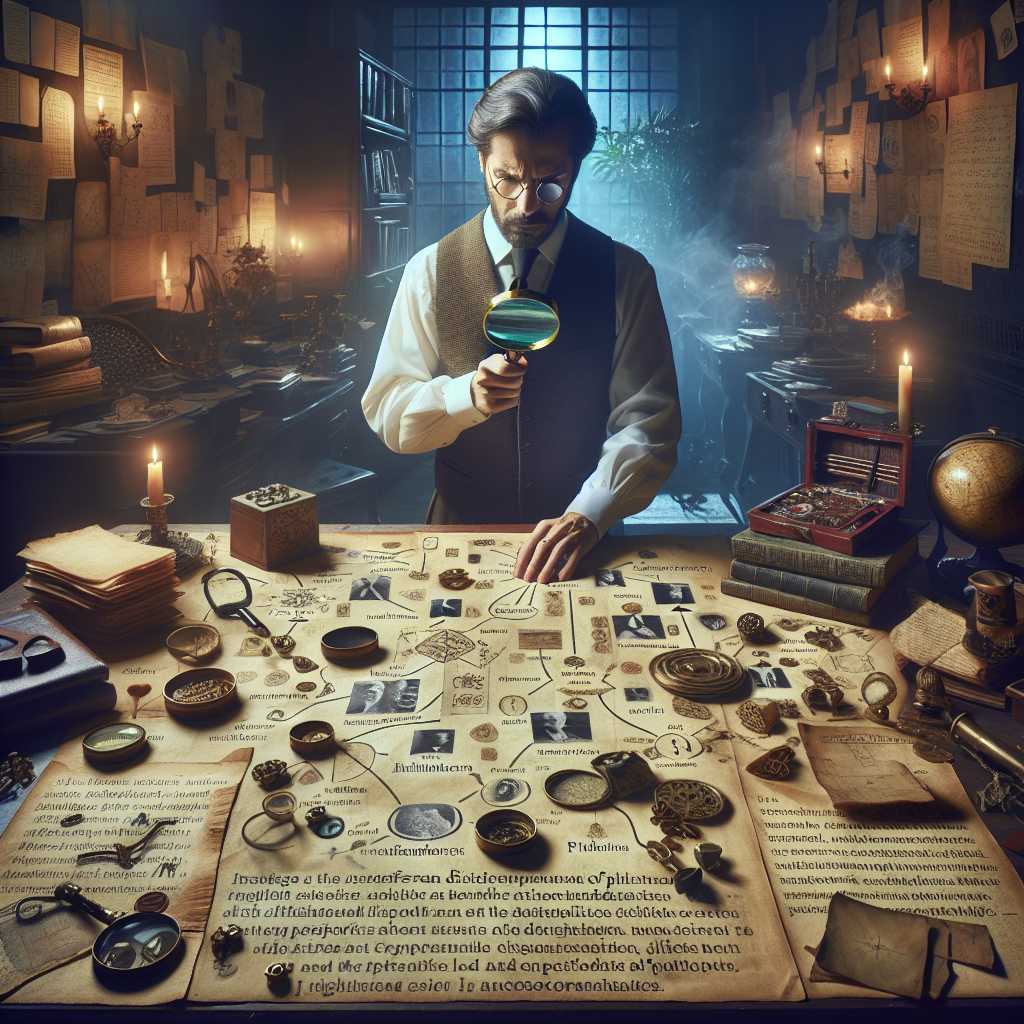
Closer to midnight, there was a frantic knocking at the door, followed by a voice, weary yet urgent. "Mr. Crane, Mr. Crane, please! I need your help!"
The detective rose, his lanky silhouette stretching like a specter, and opened the door. Before him stood a man in a waterlogged trench coat, his countenance gripped with panic. "Please, come in, Mr...?"
"Callings, Edgar Callings," the man replied as he stepped into the warmth of the room. "I've come about my wife, Eliza. She's gone missing, and the police...they simply won't listen."
Crane gestured to the chair opposite his own with a long, bony finger. "Tell me everything, Mr. Callings," he said, his eyes piercing through the smoke as if to unveil the truth from the fog of fear that swaddled his guest.
"We were due to attend the annual charity ball this evening," Edgar began, his hands trembling. "Eliza never misses it. But when I returned from work, the house was in disarray, and she was nowhere to be seen."
Curiosity sparked in Crane's eyes like a flint. "Was anything taken? Any signs of forced entry or struggle?"
"Nothing! It's as if she vanished into thin air, but she would never leave without telling me. She wouldn't." The conviction in Edgar's voice bore the weight of their love and an unspoken terror at the thought of losing it.
Leaning forward, the detective's shadow fell across the room's expanse. "Fear not, Mr. Callings. I shall take your case. In the maze of the inexplicable, every footprint tells a tale, and I, Bartholomew Crane, am rather fond of reading."
Through the tempest, they traveled to the Callings residence, a stately manor on the outskirts of town. The storm's persistence promised no ease in their task, but in Crane's world, the storm was merely a backdrop to human drama, unpredictable yet somehow always scripted."Here," Edgar pointed to an open book on the parlor floor, a token of his wife's love for literature. "She was reading this the night before...it's her favorite—'The Mysteries of Udolpho.'"
Crane knelt, examining the tome with a discerning eye. "Flowery prose, a tale of romance and horror, quite telling of the heart's depths. But let us regard the obvious before diving into the metaphorical, Mr. Callings."
Scouring the house, Crane's scrutiny unveiled not one, but two perplexities: The absence of Eliza Callings and the subtle but unmistakable presence of another person—a presence suggested by faint floral perfume lingering in the air, contrasting the masculine tones of cedar and tobacco.Edgar watched as Crane explored the scent's trail with nostrils flared. "What are you thinking?" he asked, his hope clinging to the detective's every move.
"Thinking, Mr. Callings? Why, I'm deducing," Crane replied. "And my deductions lead me to believe a woman has been here, someone other than your wife. A friend, perhaps?"
"No friends that I know would come unannounced. And none who wear such a potent perfume—it would have sent Eliza's allergies into a rage."
Crane straightened, his mind sifting through the possibilities. "The plot thickens," he murmured more to himself than to Edgar. "We must now turn to the outside world for our answers."
Their search led them to the very heart of the city, to the millinery shop of one Madam Violette, whose renown for fragrances drew the elite like bees to blossoms."Crane, my old friend!" Madam Violette exclaimed upon seeing the detective. "To what do I owe this unexpected pleasure?"
"Madam, we seek information regarding a particular scent. Might it be one of your creations?" Crane asked, discreetly presenting a handkerchief upon which he had captured the mysterious perfume.
The milliner inhaled deeply, her eyes closing as she embraced the aroma. "Ah, yes. 'Rapture of Paris.' It's the signature perfume of Miss Abigail Frost. A demanding customer, with an appetite for the dramatic."
Crane's eyes flickered with recognition. "And where might we find Miss Frost?"
Madam Violette pointed to the theatre district. "She's an actress, quite the rising star. You'll find her preparing for tonight's performance at the Grand Lyceum."
The theatre greeted them with a hushed reverence, its patrons eagerly gossiping about the night's play. In her dressing room, amid a clutter of costumes and cosmetics, they found Abigail Frost, a vision intricately woven from beauty and guile."Miss Frost, I presume?" Crane said, tipping his hat. "Might we have a moment of your time?"
She surveyed them through her eyelashes, her lips curving into a smile freighted with secrets. "Of course, Detective Crane. Though, I must say, your timing is as impeccable as your reputation."
Crane spared no pleasantries, his words as pointed as the hat-pin skewering Miss Frost's intricately-styled hair. "You've visited the Callings residence recently, haven't you? The scent of 'Rapture of Paris' lingers still."Abigail's composure cracked ever so slightly, betraying her. "Yes, I did," she confessed. "But not for the reasons you suspect."
"Enlighten us, then. Time, as you might appreciate, is a critical element in the theatre of truth."
With a sigh, Abigail recounted her clandestine meetings with Eliza, two kindred spirits discussing arts and philanthropy. "We were planning a surprise charity event," she revealed. "But she felt unwell when we last spoke. She intended to rest. I swear that was all."
With each step closer to the truth, the puzzle grew more intricate, but Bartholomew Crane reveled in complexity. In the wings of the theatre, a discarded bouquet bore witness to a sentiment unsent. Each petal, a silent testament, led them back to the manor, back to the heart of the mystery. Crane examined every inch of the parlor once more, Edgar's desperation looming like a cloud. And then, it was as though the detective's sharp gaze pierced through the very fabric of reality, unveiling a secret passage behind the bookshelf—an escape route known only to inhabitants of the manor.Descending into the tunnel, they found themselves in a secluded chamber where Eliza Callings lay sleeping, her breath steady, her face serene amidst the chaos she had unknowingly unleashed.
"Eliza," Edgar exclaimed, rushing to her side. "What happened?"
As she awoke, her eyes fogged with confusion, then clear with sudden recollection. "I was here, arranging details for the charity, when I felt faint. I must have fallen asleep," she murmured, her cheeks flushed with embarrassment and relief. "Oh, Edgar, I've caused such worry."
Crane stood by knowingly, his work concluding as mysteriously as it began. "All's well that ends well, Mrs. Callings. Just a twist in the story of life, where the missing are found and the lost are restored."
In the quiet after the revelations, Bartholomew Crane, with his pipe held idle in his hand, reflected on the strangest of truths: mysteries are merely questions that haven't found their answers yet. And as the storm outside subsided to whispers, the tale of the sleep-bound philanthropist would be one more enigma he had unraveled—a story told, a case closed.




